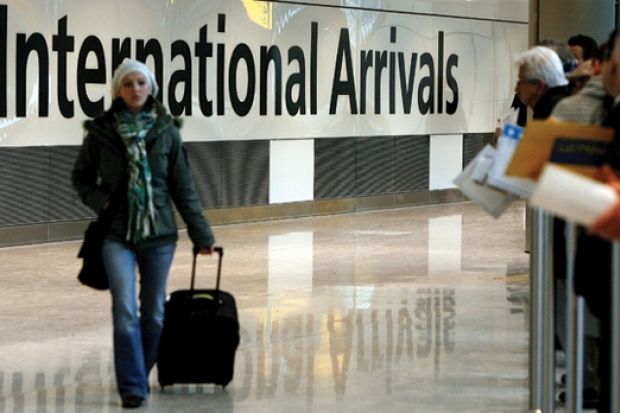Hundreds of independent colleges that recruit overseas students may go bust after failing to join a new accreditation scheme, Times Higher Education has learned.
The development poses a significant threat to the flow to British universities of fee-paying foreign students, many of whom start their UK studies at feeder institutions.
Under arrangements announced earlier this year, private colleges that wanted to continue recruiting students from outside the European Union had to apply for "educational oversight" by 9 September. But figures obtained by THE suggest that about a third of the estimated 1,200 colleges currently licensed to recruit overseas students failed to do so.
They will now be unable to apply to the UK Border Agency for Highly Trusted Sponsor status, which they will need from April 2012 if they want to recruit non-EU students.
Many of the colleges rely on these students and face bankruptcy if they cannot recruit them, although it is thought that some institutions are trying to redesign their courses so that they can accept more students on visitor visas, which can last up to 11 months for those studying English.
Home Office fails to heed own advice
The developments follow months of warnings over the damage the government's student-visa policy may be doing to the UK market for international students and the nation's export earnings.
An official impact assessment from the Home Office itself, published in June, suggests the policy could cost the UK economy up to £3.6 billion, including a loss of fee income of up to £170 million.
Private colleges are already struggling after a substantial drop in demand following what they claim are "discriminatory" changes, such as the ban on their international students working part-time.
It is feared that if hundreds of private institutions close, universities will experience serious knock-on effects.
Some have already reported that the number of direct non-EU applications for this year has fallen by up to a fifth owing to the "reputational damage" that changes to UK visa policy are having on student demand in countries such as India.
Gina Hobson, chief executive of the British Accreditation Council, said the closure of independent colleges would also raise questions about the government's ability to open up the academic market to "new entrants".
"If the (private colleges) don't continue to have access to the international student market, then (many) aren't going to be in existence to be a new entrant," she said at a conference held by Inside Government in London last week.
She added that many smaller colleges had already closed because of the increasing cost of added regulation such as applying for educational oversight, costs that were "disproportionate" to their size.
The Quality Assurance Agency, for instance, is charging colleges almost £20,000 for inspection.
Some colleges are pinning their hopes on court action being brought by the Association of UK Private Schools and Colleges, a group of about 60 institutions formed to coordinate opposition to the visa plans. It was given leave to mount a legal challenge against the Home Office following a court hearing last month.
However, the association was warned that it faced an "uphill task" to persuade a judge that the Home Office had acted unreasonably.
Anthony's dream college may have limited horizons
The New College of the Humanities - the £18,000-a-year institution launched in June by academic A.C. Grayling - may be unable to recruit from outside the European Union when it opens next September.
Times Higher Education understands that under new visa rules, start-up colleges must establish themselves with home and EU students before they can apply for "educational oversight".
At the time of its launch, Professor Grayling said that the New College - which announced last week that it had made offers to its first two students, both British - did not intend to recruit more than a third of its intake from overseas.
However, Aldwyn Cooper, principal of the private Regent's College, said he thought that the New College would need more non-EU students and that an inability to recruit overseas would be a "problem".
"If I do the numbers on the back of an envelope, the model will work only if it can recruit a lot of (foreign) students...because it is not going to get a large number of UK or EU students for a start-up company (charging £18,000 a year)," he said.
